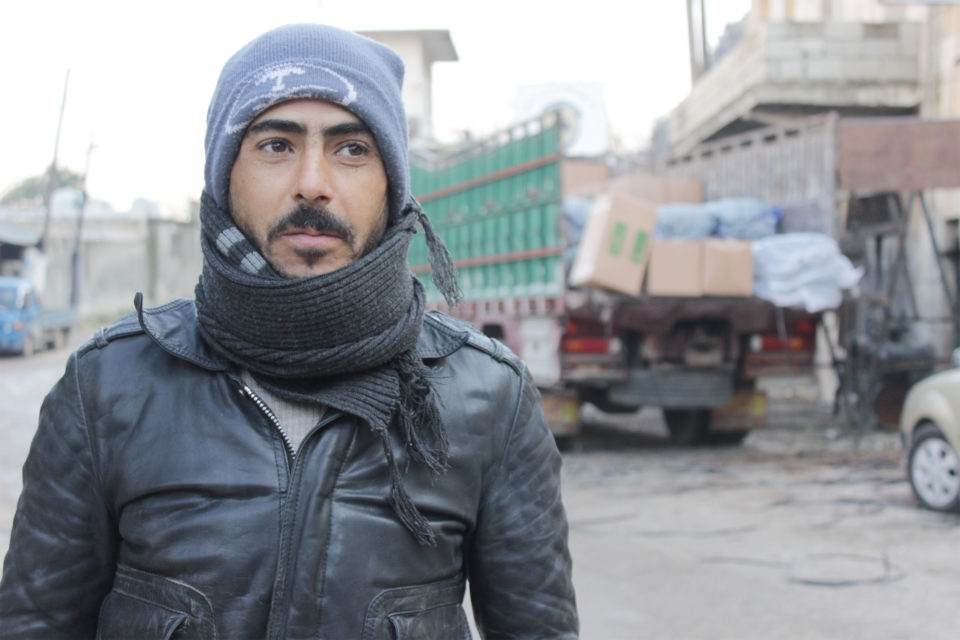
"“Sometimes I feel people outside Syria do not see us as human”"
Omar Hanandosh (36) is from the Alkallasa district of east Aleppo. He and his wife and five young children fled Aleppo when government forces (supported by Iranian militias and Russian air-power) recently took control of east Aleppo. Omar and his family made their way northwards, to Idlib governorate, where they are receiving aid from GOAL.
Omar chatted to GOAL staff about his experiences.
“Sometimes I feel people outside Syria do not see us as human”
“At one time, life in Aleppo was very good. I had a job that allowed me to make a good living. However, when a crossroads that separated the east of the city from the west began to be shelled with barrel bombs, our life turned into a tragedy. I used to work in a laundry, but the area where it was situated was destroyed by the bombings, and my job disappeared. I had then to work at whatever sort of manual labour I could get, including cleaning homes. We used to receive relief rations every month or two. Most people in the east of Aleppo depended on relief rations for their survival.
“After all the schools were bombed, my children, Ahmad and Mohammad, used to help me by selling vegetables or working in the laundry. Our area continued to be bombed heavily until the situation became unbearable.
“The army of the regime gradually put all of eastern Aleppo under siege. Sometimes the forces of the revolution would manage to lift the siege, but the regime always came back to impose the siege again.
“The Russian warplanes never stopped bombing us, sometimes seven planes would attack at a time and my family and I would hide in a cellar. We did not have time to save anyone. There are thousands of corpses and charred bodies under the rubble in East Aleppo, because the warplanes would attack whenever they saw any gathering of people. They bombed everything, even the hospitals. Because of the constant horror and the rockets, my youngest child is so traumatised he is unable to speak.
“When local children were lined up to collect water from public tankers, a warplane flew over them and fired a rocket that caused a big massacre. Between 20 and 25 children were killed that day. Bits of their flesh was strewn everywhere.
“I was close to the bombing, and ran to see if I could help. But everyone had died. Alsokkari hospital was bombed that night with four rockets, killing everyone and destroying the building.
“In east Aleppo, everyone tried to save everyone else – and life was tragic. Children could not sleep because of the horrors that have destroyed the whole area and many of the innocent people living in it.”The situation in the camps is tragic. We did not have a place to live, and crossing to Turkey is so difficult.”
“When the regime army eventually came in, people were very afraid of collective massacres. The regime army gathered all the young men in one place, claiming they were terrorists, then the Russian and regime warplanes bombed.
“There were also many complete households massacred. They used to bomb gatherings of people and claim that the revolutionaries had bombed them. After that, we went to a place where green buses came to take us away. When we got into the bus, we were cursed and insulted by regime soldiers and were afraid of being massacred. But, praise be to God, we eventually reached northern Idlib.
“The situation in the camps is tragic. We did not have a place to live, and crossing to Turkey is so difficult. People are being killed at the border. Sometimes I feel that people outside Syria do not see us as human.
“Fortunately, a person called “Abo Bassam” gave us a deserted room, which we cleaned and are now living in. I am afraid for the children separated from their families while fleeing Aleppo. I fear for all the people who have become homeless and are living in camps.
“I will stay here in Syria, for this is my homeland. I will live in hope that the country will come back good, and we can live peacefully again. And that my children can live safely and go back to school.”
Omar Hanandosh
